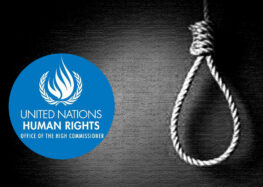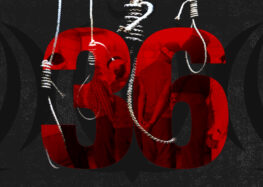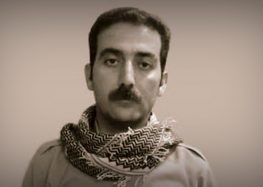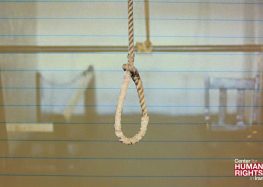Mother of Executed Iranian Scientist Describes Last Visit With Son Day Before His Death
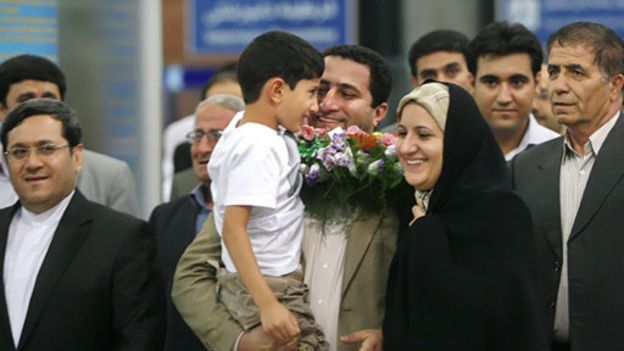
Marzieh Amiri: “I had kept silent only for the sake of my son.”
The mother of Shahram Amiri, the Iranian nuclear scientist who allegedly spied for the U.S. and was executed in Iran on August 3, 2016 in a case shrouded in mystery, has provided details about her son’s last day and six years of life in an interview with the International Campaign for Human Rights in Iran.
Marzieh Amiri, who said she obeyed the authorities’ orders and refrained from speaking to the press until now because she had been led to believe that her son would eventually be freed if she stayed quiet, said she visited him at what appeared to be a military barracks on August 2, 2016, the day before his execution. The next day security agents transferred his body to the city of Kermanshah, where his family lives.
Judiciary Spokesman Gholamhossein Mohseni Ejei told reporters on August 7, 2016 that Shahram Amiri was hanged after the Supreme Court upheld his death sentence for espionage. “This individual had access to secret intelligence as well as general state secrets,” said Ejei. “He established contact with our number one adversary, that is America, and provided the enemy with crucial intelligence about our country.”
The details about Amiri’s charges and trial have not been publicly announced. According to his mother, Amiri was held in Iran without due process.
The Campaign spoke to the grieving mother on August 8, 2016. Asked where her son had been imprisoned during the past six years, Amiri said: “We don’t know. When we asked him, he wouldn’t dare say it, because they had installed listening devices [on the phone]. We would meet him in a place that looked like a house, or sometimes in a room in the Intelligence Ministry. We would sit together for a couple of hours and then we were separated again. They would escort us out and we wouldn’t know where they were taking Shahram. They transported us in vans that had curtains and we couldn’t see what was outside. Shahram was transported in blindfolds.”
Amiri also described the last day she spent with Shahram before his execution: “We had been trying for several days to meet Shahram. I would make phone calls and every time I was told I could meet him in a week or in several days. Eventually my husband called and he was told to come for a visit and bring along anyone else of his choosing.”
“Our most recent meetings with Shahram took place at a military tribunal,” she continued. “[On the last occasion] my husband and I went to the military tribunal [in Tehran] and we were told that the meeting had been canceled and we should come back at 4:00 p.m. to be taken to another meeting place. We went there at 4:00 and [the agents] took us in their car to a place that looked like a barracks. We saw our son sitting on a chair. Agents had surrounded him. When I hugged him he said, ‘Do you know why you have come here, mother?’ And I said, ‘I have come to see you.’ He said, ‘You have come to say goodbye.’ And I said, ‘How come? Weren’t they supposed to give you a pardon?’ He said, ‘Don’t cry, be happy.’ Then I said, ‘Let me go and kiss their hands and feet’ [to beg for mercy]. He said, ‘You will never kiss their hands because you know I will rest in peace. I have been imprisoned for six years and I have nothing [worth living for]. I have been kept in a nice place. I have had good food. But I am sick.’ My son had developed blood pressure disease; he said he could no longer tolerate being alone. He wanted to rest in peace. I began to scream and yell so much that they took me away. The following day they brought his body to Kermanshah.”
Amiri continued: “At first there was no talk of putting him in prison or executing Shahram. All this happened later on. It was the hardliners who did this…It is Iran’s hardliners who are creating chaos in the world. They hanged my son. They framed him. Whatever my son said, they wrote down the opposite. They picked a lawyer for him who was on their side. They wrote down what they wanted, showed it to the judge, and he would agree. Shahram wasn’t even taken to court to be told what he had done wrong.”
False Hope
According to Amiri, she and her husband obeyed the authorities orders after being repeatedly told that their son would eventually be freed.
“In 2009, we had no information about Shahram’s whereabouts or what had happened to him. For six months the Intelligence Ministry told us to keep quiet and not reveal the fact that our son had disappeared. We stayed patient.”
“Then, after six months, they called us on the phone and told us to take a minibus from Kermanshah to Tehran and protest in front of the Saudi Embassy against the abduction of our son. We took the family and kids and went to the Saudi Embassy. The reporters came and we shouted slogans [against the Saudis] and demanded that they return our abducted son. After that was over they told us to go to the Foreign Ministry and file a complaint that Saudi Arabia had abducted our son. The head of [Iran’s] Hajj and Pilgrimage Organization came and told us that [Shahram] had disappeared [in Spring 2009] during Hajj [Muslim Pilgrimiage to Saudi Arabia].”
“After that, all we heard and all we said were dictated to us. My son did not contact me to say where he is. He did not say when he would be coming back and…when he was about to return [to Iran from the U.S. in July 2010], we were told to go to the airport to welcome him. We came to the airport and saw him for a couple of hours and then we went back to Kermanshah and did not see him for six months. Shahram had been arrested a week after his return and we were not aware of it. His father went here and there to find him and he was told that Shahram had been arrested.”
“After many visits to the Intelligence Ministry, we were finally allowed to see him. We asked the person who took us to visit Shahram what our son had done wrong. He said he had done nothing wrong. He was only a guest and would be freed after a few days. They kept saying a few days, a few days, until it became six years.”
Amiri described her son as an environmental researcher for Iran’s Ministry of Defense and rejected the Judiciary’s spokesman’s claim that her son had provided state secrets to the U.S.: “What secrets? The Americans should reveal what my son revealed to them. My son himself said the U.S. should tell the truth about what he did. Reveal everything. What state secrets could my son have? He was an environmental researcher for the Ministry of Defense. They killed an innocent man. I want the United Nations to stop these people from taking our youth like this…This is the work of a bunch of godless hardliners. They take orders from no one. If you speak out, they will frame you and do whatever they want with you.”
“I am not upset with my country. I am not even upset with my [supreme] leader. But these hardliners, they don’t listen to anyone.”
Amiri also told the Campaign that her husband, Asgar Amiri, who had been arrested in November 2015 for talking to foreign reporters about Shahram’s imprisonment and later released on bail, had at one point considered taking extreme measures out of concern for their son’s well-being.
“My husband went in front of the supreme leader’s residence to set himself on fire because we had not been allowed to visit our son for a year. He had given interviews to the BBC and Voice of America. They arrested him. His life is in danger. But he’s not dearer to me than my son. I told [the authorities] that if they kill my son or hurt him, I will not stay quiet any more. I had kept silent only for the sake of my son.”
Shahram Amiri has been described by Iranian press as a nuclear scientist and researcher at Malek Ashtar University, affiliated with Iran’s Ministry of Defense. After his disappearance, during a pilgrimage Amiri said he took to Medina in Saudi Arabia in June 2009, Iranian authorities accused the Americans of abducting him. In October 2009, Manouchehr Mottaki, Iran’s Foreign Minister at the time, claimed there was evidence that the U.S. was involved in Amiri’s disappearance.
On March 31, 2010, U.S. media reported that Amiri had defected and was cooperating with the Central Intelligence Agency (CIA). Two months later, Iran’s state television aired a video of Amiri claiming he had been “abducted in Medina in a joint operation by CIA and Saudi intelligence anti-terror units and held in the U.S. for eight months under the worst kinds of torture and psychological pressures by the CIA.” In the video he claimed that during his U.S. asylum process he had been pressured to give his laptop with secret information to the American authorities.
In the following months other videos appeared on YouTube where Amiri appeared to contradict his statements, claiming he was living freely in the U.S. and studying at the University of Arizona. In the last video he claimed he had escaped his abductors.
In July 2010, then Secretary of State Hillary Clinton told reporters Amiri had been in the U.S. “of his own free will” and could return to Iran at any time. Two days later, on July 14, 2010, Amiri returned to Tehran where he was welcomed as a national hero. But soon after, reports emerged that he had been arrested and sentenced to 10 years in prison. The Judiciary has so far not revealed any details about the charges faced by Amiri or his trial process.

